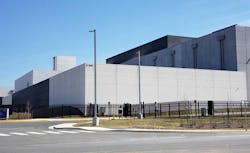CyrusOne Becomes a Private Company as $15 Billion Buyout is Completed
Data center developer CyrusOne is now a private company after completing its $15 billion sale to investment firms KKR and Global Infrastructure Partners on Friday.
It is a transition with consequences for both CyrusOne and the data center industry. The new owners bring financial resources to help CyrusOne capitalize on the huge global appetite for digital infrastructure. The company also joins the growing ranks of privately-held data center platforms backed by large global investors, a trend that impacts the competitive landscape and deal structures.
Significantly, the acquisition resolves any uncertainty about the future path of CyrusOne, which has undergone a series of leadership changes in recent years amid market rumors that the company was for sale.
“Closing this transaction begins an exciting new chapter for CyrusOne as we continue our global expansion with the benefit of significant resources and expertise that KKR and GIP are able to provide to the company and its customers,” said Dave Ferdman, President and Chief Executive Officer of CyrusOne. “We are very well positioned to capitalize on the acceleration in growth opportunities driven by strong underlying secular demand trends and create substantial value for all of our stakeholders.”
In the press release, Ferdman was referenced as President and CEO, without the “interim” title he has held since returning to lead CyrusOne last July.
Investors Transform the Cloud Landscape
CyrusOne has been a leader in the rapid growth of the data center industry, advancing techniques for building at speed and scale. The company is on the forefront of a trend in which the world’s largest hyperscale Internet companies have begun leasing cloud capacity from data center developers, rather than building their own server farms.
CyrusOne operates more than 50 data centers and 4 million square feet of data center space across the globe, working with both hyperscale operators and enterprise customers. The company’s focus on accelerated deployment has helped it reach the very top levels of the data center business. When applied at scale, over time, those techniques allow CyrusOne to create massive data center campuses.
The world’s largest investors are eager to invest in digital infrastructure, which is seeing extraordinary demand for capital to fuel the data economy. Over the past nine months, three of the most prominent public data center real estate investment trusts (REITs) have been acquired, including QTS Realty, CoreSite and now CyrusOne. Shares of Switch have gained in recent days amid reports that the company is consulting advisors about strategic options, including a sale.
These deals limit the number of options for smaller investors who are only now discovering the growth of digital infrastructure. But for long-term owners of data center REITs, the recent M&A action has already been a raucous party, as acquirers have paid premium prices to buy their way into the data center industry.
More Capital to Drive Hyperscale Growth
The new owners of CyrusOne see plenty of upside as society shifts to digital delivery of products and services.
KKR has a 40-year history of high-profile deals, including leveraged buyouts. In 2020 the firm entered the data center industry with the formation of Global Technical Realty (GTR), which plans to develop more than $2.5 billion in data center capacity. CyrusOne adds to the firm’s capabilities.
“We see significant opportunity ahead for CyrusOne to build on its market leading position and impressive track record of delivering state of the art data center solutions around the globe, at a time when the world is increasingly dependent on them, at a rapid pace,” said Waldemar Szlezak, Partner at KKR. “We look forward to leveraging our global experience investing behind digital infrastructure to, together with GIP, support CyrusOne’s continued growth, and are excited to get started.”
Global Infrastructure Partners is one of the world’s largest infrastructure funds, managing more than $79 billion in assets and offices in major global financial capitals. Infrastructure funds typically invest in large projects with predictable returns, such as airports, ports and energy generation. These funds have taken a growing interest in the strong returns available in digital infrastructure, which fits their model for a capital-intensive sector.
“Secular growth in data consumption globally has created tremendous opportunity for skilled data center developers and operators to provide critical infrastructure for their customers, including the world’s leading technology companies,” said Will Brilliant, Partner at GIP, who said the firm will work with KKR and management, “bringing our experience and deep resources as a leading infrastructure investor and operator to support CyrusOne’s differentiated global platform, which is well-positioned to continue its strong momentum and to unlock significant additional potential under its new sponsorship.”
The Private vs. Public Dynamic Continues to Evolve
The influx of capital, along with the M&A action for public players, has gradually shifted the competitive landscape in the data center industry, with more private operators and fewer public companies. As more large investors build data center platforms, the cost of capital is an increasingly important competitive differentiator, allowing companies that have low borrowing costs to build new capacity at a lower cost.
This cost advantage enables builders with low-cost capital to earn better returns than rivals with higher borrowing costs, or adjust their pricing to win more deals. This is a particular concern for public REITs, which are increasingly battling for deals with private players with deep pockets.
One question is whether large deals and more private players will mean lower returns for data center developers. Data center REITs have historically had stronger returns on capital than REITs in other assets classes like office and shopping center properties. Competitive pressures from private players could narrow margins over time. Securities analysts that track data center REITs are wary of this, and closely scrutinize returns on large deals by the companies they follow.
Executives at public players say they are used to the competition, and can maintain margins by continuing to improve the efficiency of their operations. The two largest public data center REITs. Digital Realty and Equinix, each operate giant global networks of more than 200 data centers, and have investment grade credit ratings that lower their cost of capital.
One question is how CyrusOne will approach its colocation business. In January the company sold four Houston data centers to colocation provider DataBank for $670 million. The deal raises some interesting questions about CyrusOne’s future strategy and whether it will prune its portfolio any further and divest additional assets. CyrusOne offers colocation services in many facilities, but much of its growth has been driven by its wholesale data center business, which leases larger increments of space in suites, data halls and even entire buildings.






